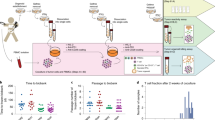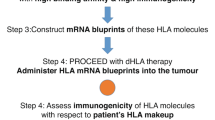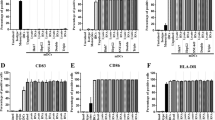Abstract
Human peripheral-blood mononuclear cells, separated by Isopaque-Ficoll flotation and E-rosette formation, were tested by the fluorescein fluorescence polarization method of Cercek & Cercek (the SCM test). The response to stimulation with PHA or cancer tissue leads to a decreased polarization value TP). The responding cells were present in the T-cell fraction (E-rosette-forming cells), which contained less than 10% macrophages and less than 1% cells with surface-bound Ig. Control experiments with the non-T-cell fraction gave different response patterns. The response of T cells from apparently healthy donors and patients with and without cancer were compared. All of the group of 16 healthy persons had a polarization value (P) which decreased (mean +/- s.e. = 23% +/- 2) after PHA stimulation, compared with no or little decrease after stimulation with cancer tissue, giving cancer indices (P cancer/PPHA) of 1.15--1.56. In 13 patients with carcinoma of the colon, stimulation with PHA produced little decrease of polarization, while stimulation with colonic cancer tissue decreased the polarization in all cases (mean +/- s.e. = 25% +/- 2). The corresponding cancer indices were 0.61--0.86. Seven of 10 colonic-cancer patients tested against ovarian cancer tissue did not respond, whilst 3 patients in this group responded and had a cancer index less than 1.0. Three patients with non-malignant diseases had response patterns similar to those of healthy persons, except for the lack of PHA response in the patient with ulcerative colitis. This method seems to open up new possibilities for evaluation of cancer patients, although further studies including many more patients are needed before any conclusion can be drawn as to the validity of the test.
This is a preview of subscription content, access via your institution
Access options
Subscribe to this journal
Receive 24 print issues and online access
$259.00 per year
only $10.79 per issue
Buy this article
- Purchase on Springer Link
- Instant access to full article PDF
Prices may be subject to local taxes which are calculated during checkout
Similar content being viewed by others
Rights and permissions
About this article
Cite this article
Ørjasæter, H., Jordfald, G. & Svendsen, I. Response of T lymphocytes to phytohaemagglutinin (PHA) and to cancer-tissue-associated antigens, measured by the intracellular fluorescence polarization technique (SCM test). Br J Cancer 40, 628–633 (1979). https://doi.org/10.1038/bjc.1979.228
Issue Date:
DOI: https://doi.org/10.1038/bjc.1979.228
This article is cited by
-
The effect of tumour progression on lymphocyte responses to lectins, measured by fluorescence polarization techniques
Journal of Biosciences (1983)



